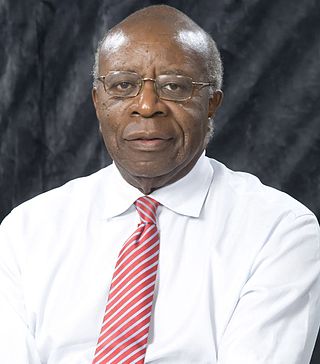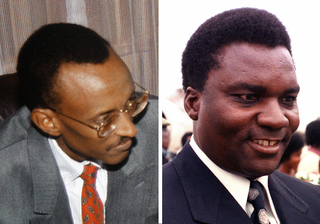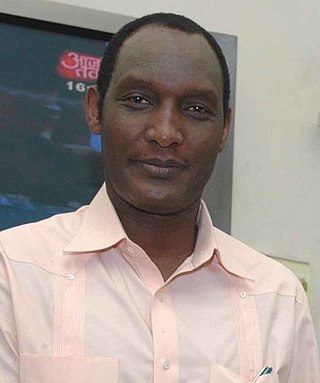Related Research Articles

The International Criminal Tribunal for Rwanda was an international court established in November 1994 by the United Nations Security Council in Resolution 955 in order to adjudicate people charged for the Rwandan genocide and other serious violations of international law in Rwanda, or by Rwandan citizens in nearby states, between 1 January and 31 December 1994. The court eventually convicted 61 individuals and acquitted 14.

Juvénal Habyarimana was a Rwandan politician and military officer who was the second president of Rwanda, from 1973 until his assassination in 1994. He was nicknamed Kinani, a Kinyarwanda word meaning "invincible".

Paul Kagame is a Rwandan politician and former military officer who has been the President of Rwanda since 2000. He was previously a commander of the Rwandan Patriotic Front (RPF), a rebel armed force which invaded Rwanda in 1990. The RPF was one of the parties of the conflict during the Rwandan Civil War and the armed force which ended the Rwandan genocide. He was considered Rwanda's de facto leader when he was Vice President and Minister of Defence under President Pasteur Bizimungu from 1994 to 2000 after which the vice-presidential post was abolished.

Hama Amadou was a Nigerien politician who was Prime Minister of Niger from 1995 to 1996 and again from 2000 to 2007. He was also Secretary-General of the National Movement for the Development of Society (MNSD-Nassara) from 1991 to 2001 and President of the MNSD-Nassara from 2001 to 2009. Amadou was from the Kurtey, a Fula sub-group, and was raised in the Tillaberi Region, in the Niger River valley, north of Niamey.

Chris Hani, born Martin Thembisile Hani, was the leader of the South African Communist Party and chief of staff of uMkhonto we Sizwe, the armed wing of the African National Congress (ANC). He was a fierce opponent of the apartheid government, and was assassinated by Janusz Waluś, a Polish immigrant and sympathiser of the Conservative opposition on 10 April 1993, during the unrest preceding the transition to democracy.

Faustin Twagiramungu was a Rwandan politician. He was Prime Minister of Rwanda from 1994 until his resignation in 1995, the first head of government appointed after the Rwandan Patriotic Front (RPF) captured Kigali. He soon came to disagree with the RPF's policies and actions, resigned and was placed under house arrest, but managed to leave the country and settle in Belgium. He continued his opposition activity against Paul Kagame's rule, subsequently returning to Rwanda and standing for elections, but without success.

Sam Rainsy is a Cambodian activist, economist and former politician who most recently served as the Leader of the Opposition. He is now the interim leader of the Cambodia National Rescue Party due to the continued ban on political activity by the party's leader, Kem Sokha. Between 1998 and 2017, he was the leading opposition figure in Cambodian politics and the main challenger to prime minister Hun Sen and the Cambodian People's Party. Since 2015, he has lived in exile, having been banned from entering the country.

The Rwandan Civil War was a large-scale civil war in Rwanda which was fought between the Rwandan Armed Forces, representing the country's government, and the rebel Rwandan Patriotic Front (RPF) from 1 October 1990 to 18 July 1994. The war arose from the long-running dispute between the Hutu and Tutsi groups within the Rwandan population. A 1959–1962 revolution had replaced the Tutsi monarchy with a Hutu-led republic, forcing more than 336,000 Tutsi to seek refuge in neighbouring countries. A group of these refugees in Uganda founded the RPF which, under the leadership of Fred Rwigyema and Paul Kagame, became a battle-ready army by the late 1980s.
Ferdinand Nahimana is a Rwandan historian, who was convicted of incitement to genocide for his role in the 1994 Genocide against Tutsi in Rwanda.
Seth Sendashonga was the Minister of the Interior in the government of national unity in Rwanda, following the military victory of the Rwandan Patriotic Front (RPF) after the 1994 genocide. One of the politically moderate Hutus in the National Unity Cabinet, he became increasingly disenchanted with the RPF and was eventually forced from office in 1995 after criticizing government policies. After surviving a 1996 assassination attempt while in exile in Kenya, he launched a new opposition movement, the Forces de Résistance pour la Démocratie (FRD). Sendashonga was killed by unidentified gunmen in May 1998. The Rwandan government is widely believed to be responsible for the assassination.

Presidential elections were held in Rwanda on 9 August 2010, the second since the Rwandan Civil War. Incumbent President Paul Kagame of the Rwandan Patriotic Front (RPF) was re-elected for a second seven-year term with 93% of the vote.

Victoire Ingabire Umuhoza is a Rwandan politician who served as chairwoman of the Unified Democratic Forces from 2006 to 2019. As an advocate for democracy and critic of President Paul Kagame, she was the UDF's candidate for the Rwandan 2010 presidential elections, but was ultimately arrested and sentenced to prison. A Sakharov Prize nominee, she served 8 years of a 15-year prison sentence in Kigali Central Prison on charges of terrorism and threatening national security. She currently leads the party Development And Liberty For All, with the focus to campaign for more political space and for development.

Faustin Kayumba Nyamwasa is a Rwandan former Lieutenant general who formerly was the Chief of Staff of the Rwandan Army from 1998 to 2002. He was also head of Rwandan intelligence from 1998 to 2002 and served as Rwanda's ambassador to India between 2004 and 2010. Nyamwasa has been an opposition leader in exile since as part of the Rwanda National Congress.
André Kagwa Rwisereka was vice-chairman of the Democratic Green Party of Rwanda, a political party founded in August 2009 until his assassination in July 2010.

Patrick Karegeya was a head of intelligence in Rwanda. He was a member of the Rwandan Patriotic Front (RPF) group that took power in Rwanda following the genocide against Tutsi. After becoming a critic of RPF leader Paul Kagame, he was stripped of his rank and jailed. Following a time in exile, he was assassinated in Johannesburg, South Africa on December 31, 2013.

Lev Borisovich Kamenev was a Russian revolutionary and Soviet politician. An Old Bolshevik, Kamenev was a leading figure in the early Soviet government, serving as the first head of state of the Russian SFSR as chairman of the All-Russian Congress of Soviets, and as a deputy premier of the Soviet Union from 1923 to 1926, among other roles.
Kizito Mihigo was a Rwandan gospel singer, songwriter, organist, composer of sacred music, television presenter, genocide survivor, peace maker and peace and reconciliation activist. Kizito was an iconic activist who dedicated his life to healing the souls of his fellow genocide survivors and rebuilding unity and reconciliation in Rwanda. According to Kisito's words, published on Kizitomihigo.com, he claimed, "The objective of my works is to console and strengthen the wounded hearts, singing peace and forgiveness." His ultimate performance in healing and Peacebuilding started in 2010 when he created the Kizito Mihigo Peace Foundation, a non-profit organization devoted to his cause.
Thomas Nahimana, is a former Catholic priest and a Rwandan. He is the founder and leader of the Ishema Party, and a key figure in the opposition to President Paul Kagame. Thomas Nahimana is also the leader of the "New Generation", a movement that seeks change and democracy in Rwanda using nonviolent methods.

General elections were held in Burundi on 20 May 2020 to elect both the president and the National Assembly. Évariste Ndayishimiye of the ruling CNDD–FDD was elected president with 71% of the vote. In the National Assembly elections, the CNDD–FDD won 72 of the 100 elected seats.
Since the end of the Rwandan Civil War, many forms of censorship have been implemented in Rwanda.
References
- 1 2 Gahunde, Chaste. "NOVEMBER 23rd 2016 IS THE DATE TO LAND IN RWANDA TO CLAIM THE POLITICAL SPACE". therwandan.com. Archived from the original on 20 November 2017. Retrieved 2017-03-31.
- 1 2 3 4 "Rwanda: Le parti Ishema dévoile son programme à Bruxelles". jambonews.net (in French). May 16, 2013. Retrieved October 28, 2021.
- ↑ Jeanne. "PRESS RELEASE: We strive to get "TOGETHER TO MODERNIZE RWANDA"". ishema-party.org. Retrieved October 29, 2021.
- 1 2 Uwiringiyimana, Clement (November 24, 2016). "Rwandan priest with political ambitions says barred from returning". Reuters . Retrieved October 28, 2021.
- ↑ "Rwanda Denies Controversial Priest Entry Again", The East African, January 24, 2017, accessed February 6, 2017 at http://www.allafrica.com/stories/201701260059.html
- 1 2 Buchanan, Elsa (January 24, 2017). "Opposition leader Thomas Nahimana prevented from returning to Rwanda, again". Archived from the original on January 22, 2018.